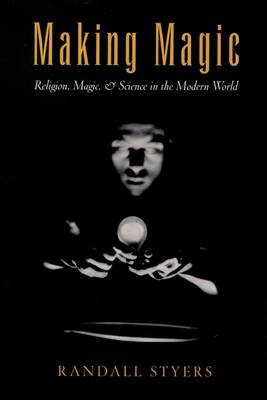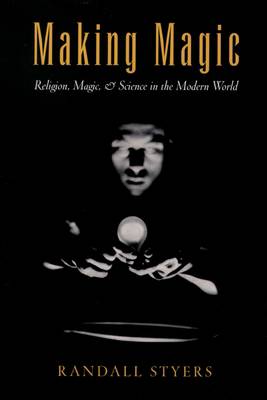
- Afhalen na 1 uur in een winkel met voorraad
- Gratis thuislevering in België vanaf € 30
- Ruim aanbod met 7 miljoen producten
- Afhalen na 1 uur in een winkel met voorraad
- Gratis thuislevering in België vanaf € 30
- Ruim aanbod met 7 miljoen producten
Zoeken
Omschrijving
Since the emergence of religious studies and the social sciences as academic disciplines, the concept of "magic" has played a major role in defining religion and in mediating the relation of religion to science. Across these disciplines, magic has regularly been configured as a definitively non-modern phenomenon, juxtaposed to distinctly modern models of religion and science. Yet this notion of magic has remained stubbornly amorphous.
In Making Magic, Randall Styers seeks to account for the extraordinary vitality of scholarly discourse purporting to define and explain magic despite its failure to do just that. He argues that this persistence can best be explained in light of the Western drive to establish and secure distinctive norms for modern identity, norms based on narrow forms of instrumental rationality, industrious labor, rigidly defined sexual roles, and the containment of wayward forms of desire. Magic has served to designate a form of alterity or deviance against which dominant Western notions of appropriate religious piety, legitimate scientific rationality, and orderly social relations are brought into relief. Scholars have found magic an invaluable tool in their efforts to define the appropriate boundaries of religion and science. On a broader level, says Styers, magical thinking has served as an important foil for modernity itself. Debates over the nature of magic have offered a particularly rich site at which scholars have worked to define and to contest the nature of modernity and norms for life in the modern world.
In Making Magic, Randall Styers seeks to account for the extraordinary vitality of scholarly discourse purporting to define and explain magic despite its failure to do just that. He argues that this persistence can best be explained in light of the Western drive to establish and secure distinctive norms for modern identity, norms based on narrow forms of instrumental rationality, industrious labor, rigidly defined sexual roles, and the containment of wayward forms of desire. Magic has served to designate a form of alterity or deviance against which dominant Western notions of appropriate religious piety, legitimate scientific rationality, and orderly social relations are brought into relief. Scholars have found magic an invaluable tool in their efforts to define the appropriate boundaries of religion and science. On a broader level, says Styers, magical thinking has served as an important foil for modernity itself. Debates over the nature of magic have offered a particularly rich site at which scholars have worked to define and to contest the nature of modernity and norms for life in the modern world.
Specificaties
Betrokkenen
- Auteur(s):
- Uitgeverij:
Inhoud
- Aantal bladzijden:
- 304
- Taal:
- Engels
- Reeks:
Eigenschappen
- Productcode (EAN):
- 9780195169416
- Verschijningsdatum:
- 15/01/2004
- Uitvoering:
- Paperback
- Formaat:
- Trade paperback (VS)
- Afmetingen:
- 152 mm x 230 mm
- Gewicht:
- 444 g

Alleen bij Standaard Boekhandel
+ 238 punten op je klantenkaart van Standaard Boekhandel
Beoordelingen
We publiceren alleen reviews die voldoen aan de voorwaarden voor reviews. Bekijk onze voorwaarden voor reviews.











